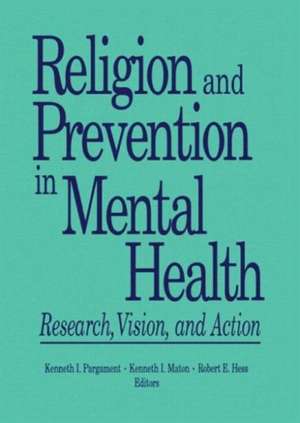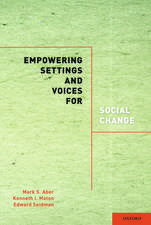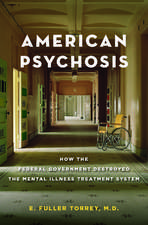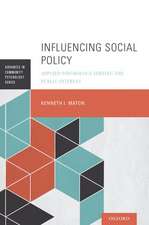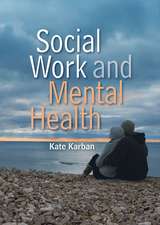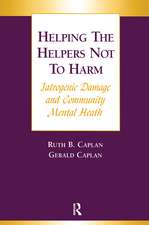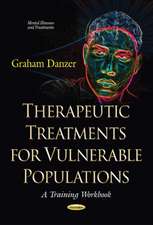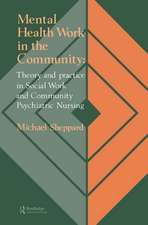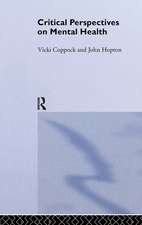Religion and Prevention in Mental Health: Research, Vision, and Action
Autor Robert E. Hess, Kenneth I. Maton, Kenneth Pargamenten Limba Engleză Paperback – 11 dec 1992
Important issues such as the impact of religion on American society and the ethos of mental health and prevention, the historical and contemporary role of the African-American church as an empowering agent and mediating structure for black citizens, the critical roles of theology in determining the attitude of religious systems toward prevention and well-being, the importance of community and personal narratives, and the limitations of religious settings due to their survival concerns and methods to increase their potential to heal are all discussed thoroughly. Through a better understanding of religious settings, programs, and processes, human service professionals can more effectively utilize religion and reach a neglected portion of the population in need of help. In addition, religious leaders, mental health professionals including counselors, social workers, program developers, evaluators, and administrators, and psychologists, sociologists, and anthropologists will benefit from the comprehensive material provided in this timely book.
| Toate formatele și edițiile | Preț | Express |
|---|---|---|
| Paperback (1) | 250.58 lei 6-8 săpt. | |
| Taylor & Francis – 11 dec 1992 | 250.58 lei 6-8 săpt. | |
| Hardback (1) | 916.57 lei 6-8 săpt. | |
| Taylor & Francis – 29 dec 1992 | 916.57 lei 6-8 săpt. |
Preț: 250.58 lei
Preț vechi: 328.46 lei
-24% Nou
Puncte Express: 376
Preț estimativ în valută:
47.96€ • 52.12$ • 40.32£
47.96€ • 52.12$ • 40.32£
Carte tipărită la comandă
Livrare economică 21 aprilie-05 mai
Preluare comenzi: 021 569.72.76
Specificații
ISBN-13: 9781560242260
ISBN-10: 1560242264
Pagini: 346
Dimensiuni: 152 x 229 x 22 mm
Greutate: 0.64 kg
Ediția:1
Editura: Taylor & Francis
Colecția Routledge
Locul publicării:Oxford, United Kingdom
ISBN-10: 1560242264
Pagini: 346
Dimensiuni: 152 x 229 x 22 mm
Greutate: 0.64 kg
Ediția:1
Editura: Taylor & Francis
Colecția Routledge
Locul publicării:Oxford, United Kingdom
Public țintă
Professional Practice & DevelopmentCuprins
ContentsReligion as a Resource for Preventive Action
- I. Religion as a Resource for Preventive Action: Conceptual and Empirical Foundations
- Religious Perspectives on Prevention: The Role of Theology
- A Sociological Overview: Mental Health Implications of Religio-Cultural Megatrends in the United States
- Review of Religion and Mental Health: Prevention and the Enhancement of Psychosocial Functioning
- Religious Factors in Physical Health and the Prevention of Illness
- Religion and Prevention of Illness in Later Life
- II. Religion as a Resource for Preventive Action: Toward the Promised Land
- The Religious Dimensions of Coping: Implications for Prevention and Promotion
- Religious Aspects in the Resolution of Parental Grief: Solace and Social Support
- Toward a Psychosocial Conceptualization of Religion as a Resource in Cancer Care and Prevention
- Prevention Theory and Action From the Religious Perspective
- Healing and Empowering Through Community Narrative
- The African-American Church: A Source of Empowerment, Mutual Help, and Social Change
- Reciprocal Ministry: A Transforming Vision of Help and Leadership
- Congregational Consultation
- Networking Between Agencies and Black Churches: The Lay Health Advisor Model
- Preventing Homelessness: Religious Organizations and Housing Development
- Reference Notes Included
Notă biografică
Robert E Hess, Kenneth I Maton, Kenneth Pargament
Descriere
Here is the first book which highlights the unique resource of religion in the field of prevention. Until now, religious systems have been a largely undertapped resource of talent, energy, care, and physical and financial assets. Religion and Prevention in Mental Health is a significant new volume that lays a general foundation for preventive work in the religious area. It presents a number of reasons for examining religion as a source for aiding prevention and well-being. The authors dispute the popular notion of religion as damaging to mental health, as well as the idea that religious affiliation is entirely predictive of better mental health. Instead they focus on the framework for living that religions provide which assists believers in anticipating, avoiding, or modifying problems before they develop. For the human service professional willing to build a collaborative relationship with religious systems, this vital book depicts the richness and diversity of religion and shows the interface of religion, well-being, and prevention.
